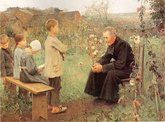 The Heidelberg Catechism: Lord's Day 29 78. Question: Are then the bread and wine changed into the real body and blood of Christ? Answer: No. Just as the water of baptism is not changed into the blood of Christ and is not the washing away of sins itself but is simply God's sign and pledge,[1] so also the bread in the Lord's supper does not become the body of Christ itself,[2] although it is called Christ's body[3] in keeping with the nature and usage of sacraments.[4] [1] Eph. 5:26; Tit. 3:5. [2] Matt. 26:26-29. [3] I Cor. 10:16, 17; 11:26-28. [4] Gen. 17:10, 11; Ex. 12:11, 13; I Cor. 10:3, 4; I Pet. 3:21. 79. Question: Why then does Christ call the bread His body and the cup His blood, or the new covenant in His blood, and why does Paul speak of a participation in the body and blood of Christ? Answer: Christ speaks in this way for a good reason: He wants to teach us by His supper that as bread and wine sustain us in this temporal life, so His crucified body and shed blood are true food and drink for our souls to eternal life.[1] But, even more important, He wants to assure us by this visible sign and pledge, first, that through the working of the Holy Spirit we share in His true body and blood as surely as we receive with our mouth these holy signs in remembrance of Him,[2] and, second, that all His suffering and obedience are as certainly ours as if we personally had suffered and paid for our sins.[3] [1] John 6:51, 55. [2] I Cor. 10:16, 17; 11:26. [3] Rom. 6:5-11.
0 Comments
Leave a Reply. |
The Heidelberg
|
 RSS Feed
RSS Feed
